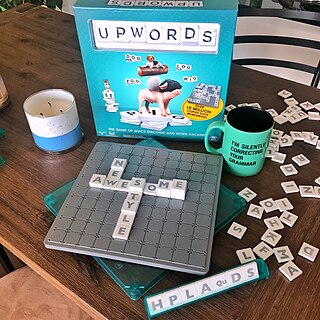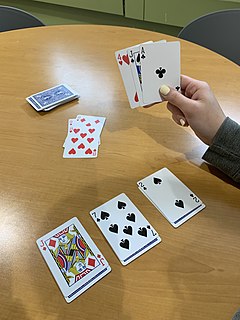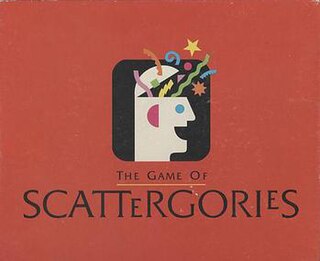Related Research Articles
Scrabble is a word game in which two to four players score points by placing tiles, each bearing a single letter, onto a game board divided into a 15×15 grid of squares. The tiles must form words that, in crossword fashion, read left to right in rows or downward in columns, and be included in a standard dictionary or lexicon.

Tic-tac-toe, noughts and crosses, or Xs and Os is a paper-and-pencil game for two players, X and O, who take turns marking the spaces in a 3×3 grid. The player who succeeds in placing three of their marks in a horizontal, vertical, or diagonal row is the winner.

Upwords is a board game invented by Elliot Rudell and originally published by the Milton Bradley Company, now a division of Hasbro. Worldwide marketing rights to UPWORDS have been licensed to Spin Master Inc. by Rudell Design, LLC as of 2018. Upwords is similar to Scrabble, or Words With Friends, in that players build words using letter tiles on a gridded gameboard. The point of difference is that in Upwords letters can be stacked on top of other letters already on the gameboard to create new words. The higher the stack of letters, the more points are scored. This typically makes words built in later turns of the game more valuable than earlier words, increasing play intensity and adding a level of strategy unique to Upwords. The memorization of two-letter words is considered a useful skill in this game.

Shithead is a card game, the object of which is to lose all of one's playing cards, with the final player being the "shithead". The game became popular among backpackers in the late 20th century. Although the basic structure of the game generally remains constant, there are regional variations to the game's original rules.

Jotto is a logic-oriented word game played with two players, a writing implement, and a piece of paper with the alphabet on it. Each player writes a secret word and attempts to guess the other player's word.

Eleusis is a shedding-type card game where one player chooses a secret rule to determine which cards can be played on top of others, and the other players attempt to determine the rule using inductive logic.

Cheat is a card game where the players aim to get rid of all of their cards. It is a game of deception, with cards being played face-down and players being permitted to lie about the cards they have played. A challenge is usually made by players calling out the name of the game, and the loser of a challenge has to pick up every card played so far. Cheat is classed as a party game. As with many card games, cheat has an oral tradition and so people are taught the game under different names. The game is called "I Doubt It" by Edmond Hoyle and is commonly known as "Cheat" in Britain and "Bullshit" in the United States.

HeroQuest, sometimes written as Hero Quest, is an adventure board game created by Milton Bradley in conjunction with the British company Games Workshop. The game was loosely based around archetypes of fantasy role-playing games: the game itself was actually a game system, allowing the gamemaster to create dungeons of their own design using the provided game board, tiles, furnishings and figures. The game manual describes Morcar/Zargon as a former apprentice of Mentor, and the parchment text is read aloud from Mentor's perspective.

Des chiffres et des lettres is a French television programme. It was created by Armand Jammot and tests the numeracy skills and vocabulary of two contestants. It is one of the longest-running game shows in the world, and the inspiration for Countdown on Britain's Channel 4.
Catch Phrase is a word guessing party game commercially available from Hasbro.
Botticelli is a guessing game where one person or team thinks of a famous person and reveals the initial letter of their name, and then answers yes/no questions to allow other players to guess the identity. It requires the players to have a good knowledge of biographical details of famous people.
Scrabble variants are games created by changing the normal Scrabble rules or equipment.

Scattergories is a creative-thinking category-based party game originally published by Parker Brothers in 1988. Parker Brothers was purchased by Hasbro a few years later, and they published the game internationally under their Milton Bradley brand. The objective of the 2-to-6-player game is to score points by uniquely naming objects within a set of categories, given an initial letter, within a time limit. The game is based on a traditional game known as Tutti Frutti, Jeu du Baccalauréat, Stadt Land Fluss, and many other names.

Bulls and Cows is an old code-breaking mind or paper and pencil game for two or more players, predating the commercially marketed board game Mastermind.

Probe is a parlor game or board game introduced in the 1960s by Parker Brothers. It is reminiscent of the simple two-person game Hangman, whose object is to guess a word chosen by another player by revealing specific letters. Probe extends the number of players to a maximum of four and introduces additional game elements that increase the levels of both skill and chance. Like Hangman, each player has a secret chosen word. But unlike Hangman, the game ends when the last word, not the first word, is revealed. All players remain in the game until the end. It was created by Ted Leavitt and licensed by him to Parker Brothers.

Bookworm Adventures is a word-forming puzzle video game, the follow-up to Bookworm from PopCap Games. Released in November 2006, Bookworm Adventures combines the "create words from sets of letters" aspect of Bookworm with several elements of a role-playing video game. In the 2007 Interactive Achievement Awards, Bookworm Adventures won the "Downloadable Game of the Year". The game also won three Zeeby awards for Best Word & Trivia Game of 2006, Best Game Design of 2006 and Best Story/Narrative of 2006.

TV Slagalica or simply Slagalica is Serbia’s longest-running quiz show produced by RTS and airs on RTS1. It is based on Des chiffres et des lettres, a French game show. It first aired on November 22, 1993. at 7 pm. It consists of seven simple mind games. Contestants play for a spot in the quarter finals, semi finals and then the finals. Contestants win prizes as they progress. It has three female hosts: Marija Veljković, Kristina Radenković and Milica Gacin. After the end of each 10th series, winners of each of the previous 10 series', with an addition of 6 runner ups, play in the superfinal using the same system as a regular series. In the superfinal, there is also an additional game played.
Family Game Night is an American television game show based on Hasbro's family of board games and EA's video game franchise of the same name. The show is hosted by Todd Newton. Burton Richardson announced for the first two seasons, until he was replaced by Stacey J. Aswad for the third season, and then Andrew Kishino beginning in the fourth season. The 60-minute program debuted on October 10, 2010 on The Hub, formerly Discovery Kids. The network would become Discovery Family on October 13, 2014; it was previewed on October 9, 2010 on its sister channel, TLC. Seasons 1 through 3 each contained between 20 and 30 episodes. Seasons 4 and 5 each contained 15 episodes. Season two premiered on Friday, September 2, 2011, and new games were added. The games added to the second season included Cranium Brain Breaks, Green Scream, Ratuki Go-Round, Simon Flash, Operation Sam Dunk, Trouble Pop Quiz, and Spelling Bee.
Court Piece is an Iranian trick-taking card game similar to the card game whist in which eldest hand makes trumps after the first five cards have been dealt, and trick-play is typically stopped after one party has won seven tricks. A bonus is awarded if one party wins the first seven tricks, or even all tricks. The game is played by four players in two teams, but there are also adaptations for two or three players.

Scrabble Showdown was an American game show created for the American cable network The Hub. The program was based on the board game Scrabble and was hosted by Justin Willman. It ran from September 3, 2011, to April 15, 2012.
References
- 1 2 3 "In-Door Amusements". Harper's Young People. 3 (130). 25 April 1882. Retrieved 9 August 2020.
- ↑ Brandreth, Gyles. Everyman's word games. Dent. ISBN 0460047116.
- ↑ Parlett, David. The Penguin book of word games. Penguin Books. p. 53. ISBN 0140056866.